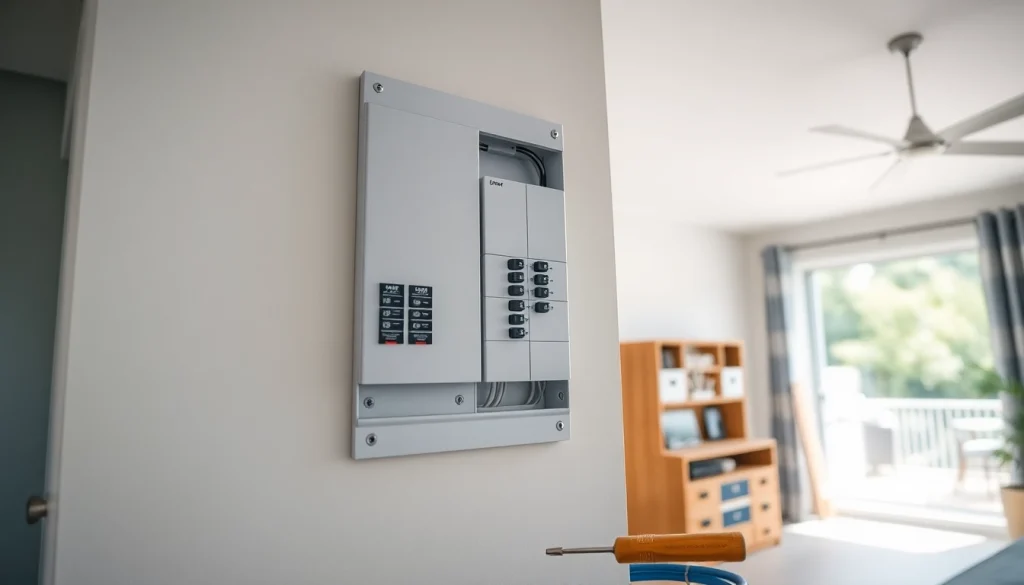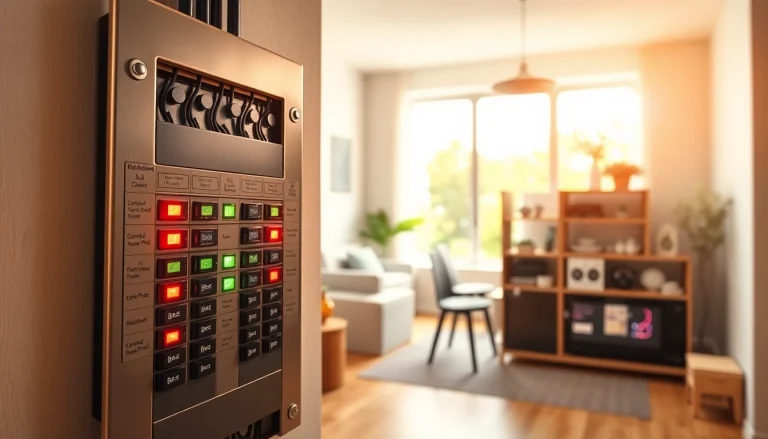
Understanding the Electrical Panel and Its Role in Your Home
The electrical panel, often referred to as the breaker box or service panel, is a critical component of your home’s electrical system. It acts as the hub that connects your electrical service to your home’s wiring, distributing electricity while protecting the circuits from overloads and faults. Understanding the function and importance of your Electrical Panel is crucial for homeowners, especially when considering upgrades or maintenance. This article aims to delve deeper into the various aspects of electrical panels, including when to upgrade, the different types available, and how to properly maintain them.
What is an Electrical Panel?
At its core, an electrical panel is a metal box installed in homes that serves as the main distribution point for electricity. Inside the panel, multiple circuit breakers or fuses are utilized to control the flow of electricity to different parts of the house. An electrical panel can be thought of as a traffic control system; it governs how electricity is divided among different appliances and circuits, ensuring that energy is utilized efficiently and safely.
Common Terms Associated with Electrical Panels
- Breaker: A safety device that automatically interrupts the circuit when an overload or short circuit occurs.
- Fuse: A device that melts to break the circuit when there is too much current flowing through.
- Subpanel: A smaller panel that is connected to the main panel, allowing for distribution of electricity to specific areas.
- Service Disconnect Switch: A switch that allows you to completely shut off power to the panel for safety during maintenance.
Electrical Panel Functions Explained
The main functions of an electrical panel include:
- Distribution of Electricity: It takes the incoming power from the utility and redirects it to various circuits in your home.
- Overcurrent Protection: Protects wiring and appliances from damage due to excess current by tripping the breaker or blowing a fuse.
- Grounding: Provides a safe pathway for electrical faults, which helps prevent electrical fires and electrocution.
Signs It’s Time to Upgrade Your Electrical Panel
Recognizing when to upgrade your electrical panel is crucial for the safety and efficiency of your home’s electrical system. Several telltale signs indicate that your panel might need an upgrade.
Frequent Circuit Breaker Trips
If your circuit breakers trip frequently, it may be a sign that your electrical panel is struggling to handle the demands of your appliances. This consistent interruption can indicate a problem with the panel or an overload on specific circuits. In new homes or those with increasingly electronic devices, these problems can become more pronounced.
Increased Electrical Load Requirements
Changes in lifestyle, such as purchasing new appliances, adding a home office, or upgrading HVAC systems, generally lead to increased electrical demands. If your current panel cannot accommodate the additional load, it’s time to evaluate upgrading to a panel with a higher amperage.
Old, Outdated Electrical Panels
Older homes may still be equipped with outdated electrical panels, often 60 amps or less. Modern homes typically require 100 amps or more. Upgrading to a contemporary panel not only enhances performance but also ensures compliance with modern safety standards.
Choosing the Right Electrical Panel for Your Needs
When it comes to selecting a new electrical panel, various factors need to be considered to ensure it meets your household’s electrical needs.
Types of Electrical Panels Available
There are several types of electrical panels available on the market:
- Main Breaker Panel: Features a single main breaker that controls power to all circuits.
- Subpanel: A supplementary panel that distributes electrical power to specific areas of your home, ideal for larger residences.
- Smart Panels: These advanced systems provide real-time data on energy consumption and can be integrated with home automation systems.
Factors to Consider When Selecting an Electrical Panel
Consider these key aspects when selecting an electrical panel:
- Amperage Needs: Determine the total amperage your home requires to support current and future electrical demands.
- Space and Configuration: Ensure you have the proper space for a new panel, considering its height and width.
- Local Building Codes: Familiarize yourself with local regulations that may affect the type and installation of electrical panels.
Brand Recommendations and Reviews
While choosing a brand, reviews can provide valuable insight into performance and reliability. Leading brands often recommended by electricians include:
- Square D: Known for a variety of reliable electrical panels with excellent safety features.
- GE: Offers a wide selection of panels that cater to various needs in both residential and commercial markets.
- Eaton: Revered for its advanced technology and energy-efficient solutions.
DIY Inspection of Your Current Electrical Panel
Regular inspections of your electrical panel can catch problems early and potentially prevent dangerous situations. Here’s how to conduct a DIY inspection.
Safety Precautions When Checking Your Electrical Panel
Before you begin, follow these safety precautions:
- Always turn off the main breaker before conducting any inspection.
- Use insulated tools when working near live circuits.
- If you’re uncertain about your abilities, it’s best to contact a qualified electrician.
Visual Indicators of Wear and Tear
Look for the following indicators that signify the need for professional servicing or replacement:
- Burn marks or scorch marks on the panel.
- Rust or moisture inside the panel.
- Broken or loose connections.
When to Call a Professional Electrician
If you identify any severe issues during your inspection or if you are experiencing electrical issues beyond your expertise, it’s wise to seek a professional electrician. Complexities surrounding electrical work can create hazards that should be addressed by experts.
Benefits of Upgrading Your Electrical Panel
Upgrading your electrical panel can provide multiple benefits, improving both safety and efficiency in your home.
Enhanced Safety and Prevention of Electrical Fires
One of the most significant advantages of an upgraded electrical panel is the enhanced safety it provides. Newer panels are designed with advanced technology that minimizes the risk of electrical fires caused by faulty circuits or equipment failure. Proper circuit protection helps avert overloads and short circuits, which are leading causes of household fires.
Increased Energy Efficiency and Cost Savings
Modern panels promote optimal energy usage, ensuring that all electrical components operate at their maximum efficiency. This translates into potential cost savings on your energy bill. Efficient energy management systems and smart panels allow for real-time monitoring of electricity consumption, enabling users to adapt usage for better savings.
Boosting Your Property Value
Upgrading your electrical system can significantly increase your home’s resale value. Potential buyers are more likely to show interest in homes with updated electrical systems, knowing they won’t inherit outdated components that could lead to costly repairs in the future.






